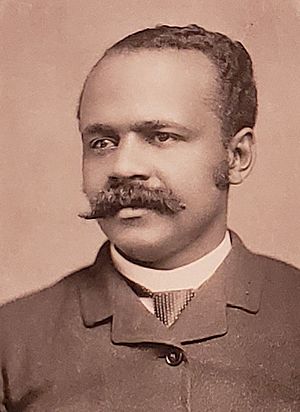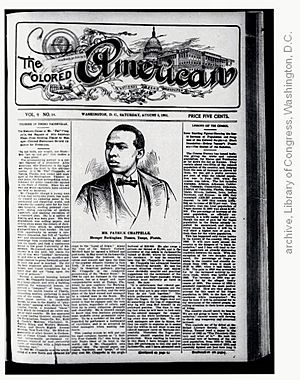Julius Caesar Chappelle facts for kids
Quick facts for kids
Julius Caesar Chappelle
|
|
|---|---|
 |
|
| Member of the Massachusetts House of Representatives from the 9th Suffolk district |
|
| In office 1883–1886 Serving with George L. Clark (1882–84)
Augustine H. Read (1885) Henry Parkman Sr. (1886) |
|
| Preceded by | John F. Andrew Henry W. Swift |
| Succeeded by | William O. Armstrong |
| Personal details | |
| Born | c. 1852 Newberry County, South Carolina |
| Died | January 27, 1904 (aged 51-52) Roxbury, Boston, Massachusetts |
| Political party | Republican |
| Spouse | Elizabeth |
| Relations | Pat Chappelle (nephew) |
Julius Caesar Chappelle (born around 1852, died 1904) was an American politician. He was born into slavery in South Carolina. Later, he became an important leader in Boston's African-American community from 1870 until he passed away.
He was the first African American to join the Massachusetts Republican State Committee. Chappelle strongly supported civil rights for all people and worked to protect consumers. Newspapers often wrote about his speeches.
Contents
Early Life and Moving North
Julius Caesar Chappelle was born into slavery in 1852. His birthplace was a plantation called Chappelle's Landing in Newberry County, South Carolina. He was of mixed race, meaning he had both African and European ancestors.
During slavery, families were sometimes split up and moved to different plantations. There is some evidence that Julius and his brother might have been moved around before returning to Newberry County.
Slavery ended when Chappelle was 13 years old, after the American Civil War. He then went to a school for black students in Edgefield, South Carolina.
During his childhood, South Carolina was a difficult place for former slaves. Groups like the Ku Klux Klan tried to stop African Americans from gaining rights. They wanted to keep white supremacy. Because of these attacks, President Ulysses S. Grant sent the United States National Guard to South Carolina in 1871. He declared martial law to stop the Ku Klux Klan.
Moving to Florida and Boston
Around 1869, Chappelle moved to LaVilla, Florida. This area is now part of Jacksonville, Florida. He helped build the black community there.
In November 1870, young Julius Chappelle moved to Boston. Boston was known for its active black community. Many people from Southern states moved there in the 1800s.
In Boston, he finished high school. He worked for the Boston Herald newspaper for 13 years. Later, he worked at a Post Office and the Boston Custom House.
Political and Civil Rights Work
Starting in Politics
A man named Lewis Hayden helped Chappelle get involved with the Republican Party. Chappelle's first job was to help people register to vote. He was very good at it. He also learned to be a barber in Chelsea, Massachusetts.
Newspapers described Chappelle as well-spoken and always looking neat. In 1886, the Boston Herald said that the African-American community admired him greatly.
Serving in the Massachusetts Legislature
In the early 1880s, Chappelle became a Republican candidate for the state legislature. He was elected for four terms, from 1883 to 1886. He became one of the first important African-American lawmakers.
His district, the Ninth Ward, was very diverse. It included wealthy areas and neighborhoods with many different ethnic groups. One part of the district was made up entirely of African-American voters.
When he was first elected, some lawmakers tried to make it hard for Chappelle to get a good seat. But he found another place to sit. The next day, the Republican Party spoke out against this action. In the House, Chappelle worked on committees dealing with federal relations and public lands.
In 1883, Chappelle proposed a bill to stop unfair labor practices in the South. He strongly supported expanding the federal Civil Rights Act of 1866. This act would stop racial discrimination in public places. He said, "It is on the principle of rights that belong to us that we want this bill passed." He also worked on consumer issues.
Winning Elections
When Chappelle was first nominated in 1882, some other African-American candidates opposed him. They even claimed he won by fraud. But a recount proved these charges were false.
In 1882, Chappelle won against Brooks Adams, who was the great-grandson of President John Adams.
In 1884, Chappelle won a very close election against Charles Albert Prince. Prince was the son of Boston's mayor. There was a confusing recount, but Prince later agreed that Chappelle had won.
In 1885, the Daily Globe newspaper noted that Chappelle was the first black man to serve in the legislature for such a long time.
Leaving the Legislature
In 1886, Chappelle decided not to run for a fifth term. He was urged to stay, but he retired from the legislature.
Republican State Committee Work
Chappelle served three one-year terms on the Massachusetts Republican Party's state committee. He represented Boston's Fifth Ward starting in 1889. In his third term, he became the president of the state committee in Boston. He was the first African American to hold this important position. He was very active in state politics.
Chappelle also attended the 1884 Republican National Convention in Chicago.
After His Time in Office
In 1886, Chappelle was appointed as an Inspector at Elections.
In 1890, Chappelle gave an "enthusiastic" speech at Faneuil Hall in Boston. He spoke about the right of black people to vote in every state. He supported the Federal Elections Bill. He said that the vote of a black person in South Carolina should be counted as honestly as a white person's vote in Massachusetts.
Concerns About the Republican Party
After leaving political office, Chappelle hoped for a job in Washington, D.C.. However, he was not offered a position. Some people criticized Massachusetts Senators for not doing enough to help African-American politicians get appointed jobs.
In 1892, Chappelle worried that the new Republican Party was not as supportive of African Americans as the older party had been. He felt that African Americans were not getting good jobs, only lower-level positions. He believed this would hurt their political standing.
At a banquet, Chappelle said that Massachusetts was no longer a safe state for Republicans. He noted that black men in public office were not even getting messenger jobs at the State House.
Against Prohibition
The Prohibition Party wanted to ban alcohol. Some African Americans also opposed alcohol sales. Chappelle's friend, William O. Armstrong, tried to get black voters to support the Prohibition Party.
However, Chappelle opposed Armstrong's efforts. In 1891, the Boston Daily Globe reported that Chappelle was working to convince African Americans not to join the Prohibition Party.
In 1895, Chappelle joined a committee to help African-American business owners get licenses to sell alcohol.
Personal Life and Social Activities
Chappelle married Elizabeth "Eugenia" Chappelle. They had a daughter named Lillian.
Julius had two brothers, Lewis and Mitchell, who were important in LaVilla, Florida. Mitchell was the Mayor of LaVilla for a time. Lewis was a successful builder.
Julius's nephew, Pat Chappelle, was a famous showman. He owned The Rabbit's Foot Company, a popular traveling show. Julius introduced Pat to entertainment promoters in Boston.
Chappelle and his wife, Eugenia, often attended social events. In 1883, they went to a popular ball at Horticultural Hall.
In 1886, Chappelle became a full member of the important Massachusetts Club. Frederick Douglass, a famous abolitionist, also became an honorary member.
In 1889, Chappelle led a meeting at the Charles Street African Methodist Episcopal Church. The meeting was about educating African Americans in the South. He also helped organize the St. John's Day Picnic that year. His political mentor, Lewis Hayden, was a speaker at the picnic.
In 1901, Chappelle spoke at a memorial for former Governor Roger Wolcott. He called the ex-Governor "the most democratic of aristocratic Boston."
Death
Julius C. Chappelle passed away in 1904 in Boston after a long illness. He was survived by his wife Elizabeth and daughter Lillian. His funeral was described as "one of the largest" in Boston in many years.
His obituary in the Boston Daily Globe said that Julius Caesar Chappelle was a unique political figure. It noted that he was one of the best-known black men in Massachusetts, along with Lewis Hayden, John J. Smith, and Edward G. Walker.
Images for kids
 | Precious Adams |
 | Lauren Anderson |
 | Janet Collins |



